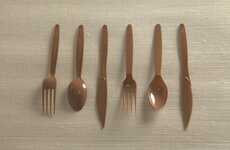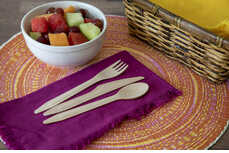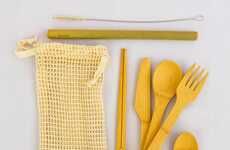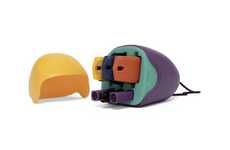
These Eco-Friendly Utensils are Made Of Rice, Wheat Flour and Millet
Rahul Kalvapalle — March 16, 2016 — Eco
References: bakeys & sploid.gizmodo
Narayan Peesapaty, an innovator based in the southern Indian city of Hyderabad, has invented novel eco-friendly utensils.
Plastic utensils are great and all when it comes to convenience and portability, but they aren't really ideal for reuse and are very harmful for the environment once discarded. Peesapaty's eco-friendly utensils however, called Bakeys, can be consumed after being used. They are made of a blend of rice, wheat flours and millet and are baked dry. They are available in plain, sweet and spicy flavors and have a shelf life of about three years.
Fun to use and good for the environment, these eco-friendly utensils are a wonderful innovation indeed. In a place like India where pollution and garbage are both growing problems, these delicious edible utensils ably manage to kill two birds with one stone.
Plastic utensils are great and all when it comes to convenience and portability, but they aren't really ideal for reuse and are very harmful for the environment once discarded. Peesapaty's eco-friendly utensils however, called Bakeys, can be consumed after being used. They are made of a blend of rice, wheat flours and millet and are baked dry. They are available in plain, sweet and spicy flavors and have a shelf life of about three years.
Fun to use and good for the environment, these eco-friendly utensils are a wonderful innovation indeed. In a place like India where pollution and garbage are both growing problems, these delicious edible utensils ably manage to kill two birds with one stone.
Trend Themes
1. Eco-friendly Utensils - Creating utensils that are not only biodegradable but also edible presents an opportunity for sustainable and waste-reducing solutions.
2. Novel Materials - Exploring alternative materials such as rice, wheat flour, and millet opens up possibilities for innovative product development that is both environmentally friendly and functional.
3. Convenience and Sustainability - Blending convenience with sustainability by offering edible utensils that can be consumed after use appeals to eco-conscious consumers and addresses the issue of single-use plastics.
Industry Implications
1. Food Packaging - The food packaging industry can incorporate the use of edible utensils as a replacement for single-use plastics, offering a more sustainable and enjoyable dining experience.
2. Sustainable Food Service - Restaurants, catering companies, and fast food chains can adopt these edible utensils to reduce their carbon footprint and offer a unique, eco-friendly dining experience to customers.
3. Eco-friendly Innovations - Companies focused on developing eco-friendly and sustainable products can explore the market potential for edible utensils as a disruptive innovation, addressing the growing concerns about plastic waste.
5.2
Score
Popularity
Activity
Freshness























